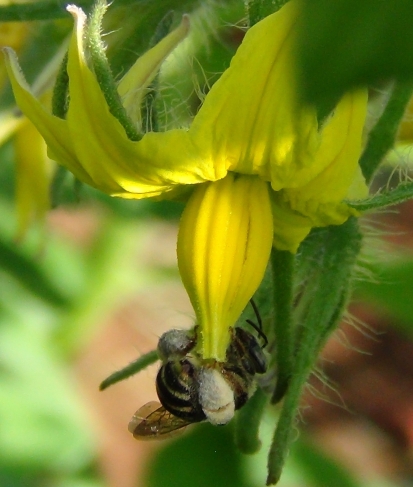Pollination deficit in open-field tomato crops (Solanum lycopersicum L., Solanaceae) in Rio de Janeiro state, Southeast Brazil
DOI:
https://doi.org/10.26786/1920-7603(2014)7Abstract
More than 70% of world’s crops benefit from biotic pollination, and bees are their main pollinators. Despite the fact that some of these insects have been broadly studied, understanding the interactions between plant crops and their pollinators with a local scale approach is necessary when aiming to apply proper protective and management measures to pollinators and their respective crops. In this context, we analyzed the pollination status of open-field tomato crops (Solanum lycopersicum L.), regarding fruit-set, visitation rate and the quality of fruits. We recorded the formation of fruits through spontaneous self-pollination and open-pollination, and the occurrence of pollinators in 24 areas of open-field tomato crops. We performed experiments of apomixis, spontaneous self-pollination, manual cross pollination and supplemental cross pollination (simulating the pollinator behavior) in a greenhouse. The fruit quality was evaluated according to circumference, weight, volume and number of seeds. Higher production of fruits after open-pollination compared to spontaneous self-pollination indicates the importance of pollinators to increment productivity of S. lycopersicum in the study area. The circumference and the number of seeds from tomatoes of the greenhouse plantation did not differ between spontaneous self-pollination and the manual cross pollination. In the open-field crops the number of seeds was higher for fruits resulting from open-pollination. Our results indicate that the importance of bees is mainly related to the increase in fruit production, thus incrementing the productivity of tomato crops.
production, thus incrementing the productivity of tomato crops.

Downloads
Published
How to Cite
Issue
Section
License
Copyright (c) 2013 Mariana Scaramussa Deprá, Geovana Girondi Delaqua, Leandro Freitas, Maria Cristina Gaglianone

This work is licensed under a Creative Commons Attribution 4.0 International License.
JPE is an open access journal which means that all content is freely available without charge to the user or his/her institution.
Authors who publish with this journal agree to the following terms:
1) Authors retain copyright and grant the journal right of first publication with the work simultaneously licensed under a Creative Commons Attribution License that allows others to share the work with an acknowledgement of the work's authorship and initial publication in this journal.
2) Authors are able to enter into separate, additional contractual arrangements for the non-exclusive distribution of the journal's published version of the work (e.g., post it to an institutional repository or publish it in a book), with an acknowledgement of its initial publication in this journal.
3) Authors are permitted and encouraged to post their work online (e.g., in institutional repositories or on their website) prior to and during the submission process, as it can lead to productive exchanges, as well as earlier and greater citation of published work (See The Effect of Open Access).
To assure a broader targeted audience, content will be included into databases (such as EBSCO) and directories (such as DOAJ).











